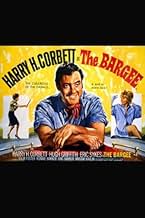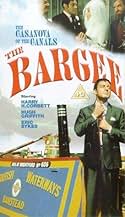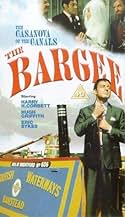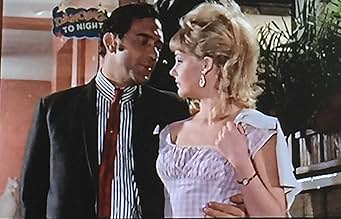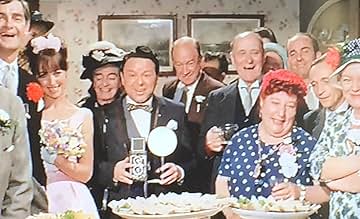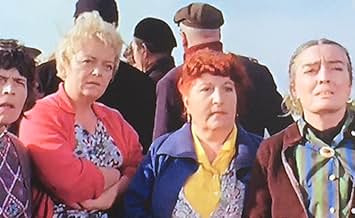Aggiungi una trama nella tua linguaA lock-keeper entrusts his daughter with a canal Casanova, and she soon falls pregnant. He refuses to open his locks until the guilty party confesses.A lock-keeper entrusts his daughter with a canal Casanova, and she soon falls pregnant. He refuses to open his locks until the guilty party confesses.A lock-keeper entrusts his daughter with a canal Casanova, and she soon falls pregnant. He refuses to open his locks until the guilty party confesses.
- Cynthia
- (as Jo Rowbotham)
- Bargee
- (non citato nei titoli originali)
- Pub Patron
- (non citato nei titoli originali)
Recensioni in evidenza
Lothario bargee, girl in every 'port' (or at least all the calling points between London & Brum on the canals). That's Corbett, and his illiterate cousin Ronnie Barker, who'd go on to be one of the top-3 comedy actors here, due to Open All Hours, Porridge, and the 2 Ronnies, and that's just the main ones!
To correct a few, Corbett WAS already Steptoe by the time this film happened, and I expect the director and backers wanted a script that played to those mannerisms, using Galton & Simpson (Steptoe creators -- as well as writing lots of other comedy material) was a good way to ensure it.
Prismark writes an unusually poor review, this was NOT like a "bad Carry on film", that series was aimed at an entirely different crowd (or did I miss Sid James & Babs Windsor somewhere?!).
Oh, and 'dimplet' (more like DIM-plet??) who is presumably American slagged off the film, but gave it 9 out of 10?!
The film is just a gentle comedy, a distraction, playing to the strengths of a mass of British character and comedy actors. Brian Wilde and Ronnie Barker would go on to great success in Porridge, Miriam Karlin had been a comedy icon in 'Rag Trade'. Julia Foster may have got selected for the massive hit film Alfie as a result of her performance in this! Etc Etc.
It adds in a poignant nod to the imminent demise of the canals as working transport for heavy loads, a respected trade in the UK for a couple of hundred years, and carrying with it the rise of the industrial age in the Victorian years.
He wouldn't and doesn't want to change this way of life until the inevitable intervenes.
Honourable mentions to Ronnie Barker, Julie Foster and Hugh Griffiths.
It depicts a way of life and attitudes that have long since gone and is enjoyable because of this.
The film starts out well with Harry Corbett and Ronnie Barker taking a commercial load on their barge via the wondrous waterways (canals) to Birmingham. Despite Corbett's off-putting accent and speech impediment (he can't say his R's), it looks like it will be a picturesque comedy/drama set amid the English countryside. But as soon as Eric Syke's annoying character (the mariner), the week-end skipper who knows nothing about boats, shows up, the voyage goes off course.
Sykes is supposed to be the comic relief, but his character is too stupid to be funny. Anyway, Corbett plots his trip with "stop-overs" at various towns where he has a woman in each port. He finally makes it to where Julia Foster and her dad, Hugh Griffith, live. She's pregnant, and the story goes off in another direction with Griffith determined to find the guy who knocked her up.
This plot drags on and on with Griffith blocking the canal and causing all sorts of trouble until some government officials show up and they finally figure out who daddy is. Even after this resolution, the story drags on til its obvious conclusion.
Griffith, Foster, and Barker do what they can with one-dimensional characters. Sykes and Corbett are lost causes. Co-stars include Miriam Karlin as the boisterous Nellie, Norman Bird and Richard Briers as the government men, Derek Nimmo as the dumb doctor, and among the canal women, Rita Webb, Patricia Hayes, and Eileen Way.
Like 'Steptoe', this movie is based around a traditional but dying industry (by the end of the film it has only 18 months), that of commercial narrow boat trading. The difference is that in 'Steptoe' the totting is very much a grim existence, but here it is a pretty much idyllic life and you can readily understand Hemel Pike's reluctance to give it up. The Technicolor helps provide a dream-like tone.
Galton and Simpson's script is strong, mixing comedy and drama as Corbett's 'Casanova of the canals' succumbs to the charms of the winsome daughter of the fiery Hugh Griffith. There is an equally strong cast to match, notably Eric Sykes as an incompetent amateur mariner and Miriam Karlin as a vengeful woman who discovers that she is not the only woman in Corbett's life. In my eyes Ronnie Barker steals every scene he is in.
This is possibly Corbett's best screen outing as star and is far better than its general reputation suggests. I first saw it around ten years ago and it failed to make an impression, re-watching it today, I fell in love with it.
The bargees are workmen, Hemel (Corbett) the ladies man trapped by a pretty girl, and propelled to the altar on the end of a shotgun, and Ronnie (Barker) his none too bright right hand man.
The film is set immediately before the end of the way of life that it portrays, as commercial narrowboat carrying came to an end on Britains waterways. At the time of its release, this was a very recent memory, the trade having been finally killed off by the severe winter of 1963.
The boats seen in the film are the genuine article, used in a film about the end of the trade, mere months after it ended. Within a very short time after the film, most of the craft had been destroyed, leaving only a few in preservation.
Lo sapevi?
- QuizThe narrow-boats Banstead and Bellerophon which were used in the film were built in 1936 and are still in existence (2016). Bellerophon became a horse drawn trip-boat on the River Wey and was renamed Iona. In this guise it made an appearance in the British TV soap Coronation Street (1960). Banstead continued to work for British Waterways until 1969 when it was sold to private use and after a career as camping boat and tearoom, Banstead is now fully restored to working condition and can often be seen on the Grand Union canal where it remains a minor celebrity, as many locals still remember the filming of The Bargee (1964) with fond memories.
- BlooperWhen planning the journey on the Grand Union Canal, the pair agree the first night at Rickmansworth, the second at Boxmoor and the third at Apsley. Geographically, Apsley is before Boxmoor and also the two places are only a mile apart, so would not both be overnight stopping points, even if in the correct order.
- Citazioni
[Doctor Scott has just told Joe that his daughter is pregnant]
Joe: She must have been drugged or something. She couldn't have done it by herself.
Doctor Scott: No, quite.
Joe: I'll kill him! So help me, I'll kill him! They way I've looked after her. I promised her mother I'd send her to grammar school. And now the first yob that comes along, this happens.
Doctor Scott: [trying to be reassuring] Oh come now. It may not have been the *first* one.
I più visti
- How long is The Bargee?Powered by Alexa
Dettagli
- Data di uscita
- Paese di origine
- Lingua
- Celebre anche come
- Kanalens Casanova
- Luoghi delle riprese
- Aziende produttrici
- Vedi altri crediti dell’azienda su IMDbPro
- Tempo di esecuzione1 ora 42 minuti
- Mix di suoni
- Proporzioni
- 2.35 : 1
Contribuisci a questa pagina




